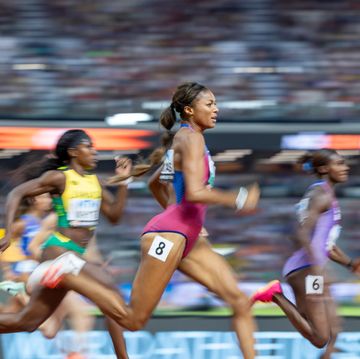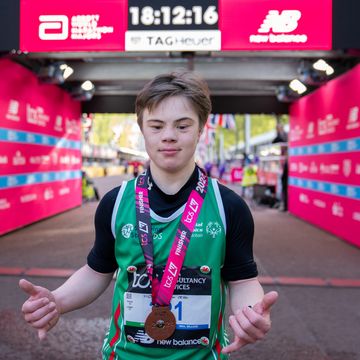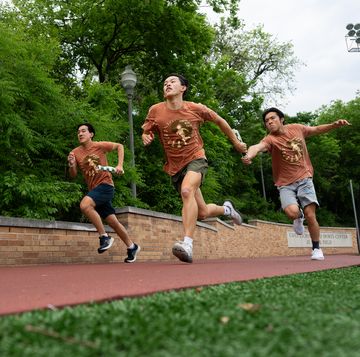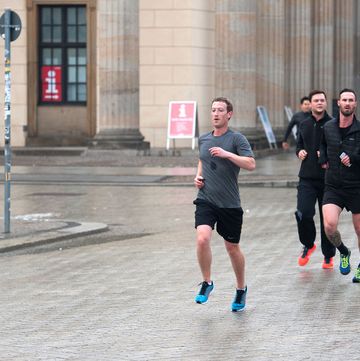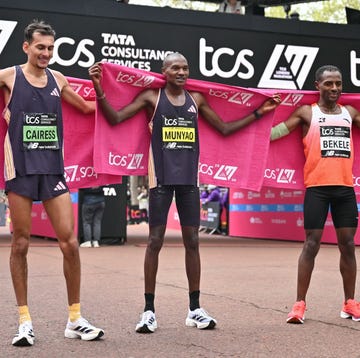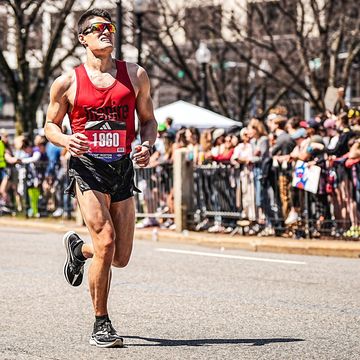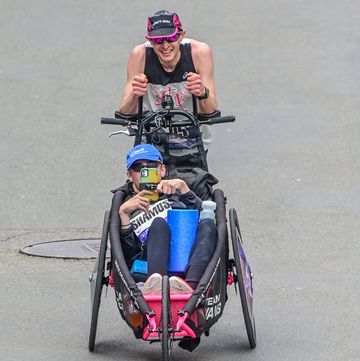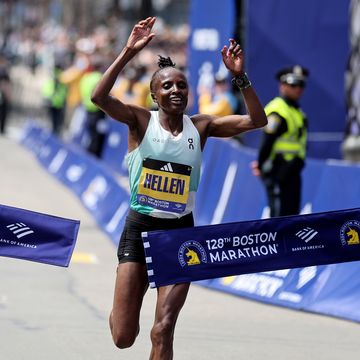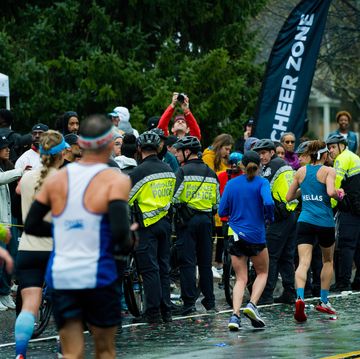When race winner Caroline Boller, 40, of Solvang, California, crossed the finish line in 2:45:27 at Sunday’s Santa Rosa Marathon, it was her personal best by six minutes and best on the Santa Rosa course by 68 minutes.
But as she was finishing, something didn’t seem quite right. Had Boller heard the announcer refer to her as the second-place woman?
Soon Boller learned that she wasn’t the first woman to cross the finish line wearing a marathon bib. Four minutes earlier, Wendy Jennings, 49, of Huntington Beach, California, had finished. She was initially recorded in a time of 2:41:23.
Arthur Webb, the race’s cofounder who handles logistics for the event, said he didn’t think anything of it at first. He saw a woman cross the finish line wearing a marathon bib, so he placed a finisher’s medal around her neck, assuming she was the winner.
But race timer Jeannine Henderson was watching carefully, and she immediately thought something was off.
By her estimation, Jennings was moving too slowly to be the race winner, and she didn’t have a lead bike with her.
“As she ran toward me, I yelled at her, because I was right at the finish line, ‘Full marathon?’ and she didn’t respond, so I figured she didn’t hear me,” Henderson told Runner’s World Newswire. “So after she crossed, I ran after her and I said, ‘Are you in the full?’ and she kind of nodded…And I said, ‘You just did 26.2?’ And she was just kind of like, ‘Yeah.’”
GET MORE NEWSWIRE: Sign up for the RW Daily newsletter
Boller, meanwhile, approached Webb to confirm with race organizers that she had indeed won the women’s race. They walked over to Henderson at the timing table, who had already checked Jennings’ on-course splits. Jennings had recorded no splits on the course.
Did the Santa Rosa Marathon have a Rosie Ruiz situation on its hands? For a little while, it looked like that might be the case. Within 30 minutes of the women’s finish, Webb disqualified Jennings from the race. It took longer than that, however, to figure out exactly what had happened.
When the dust cleared, it appeared that the whole situation was a misunderstanding. Jennings had started the marathon race at 6 a.m., one hour before the half marathon start. She wrote in a message to Newswire that she had intended to run the full marathon with her husband, Don Jennings, who was running his first marathon. She had injured her knee in a trail half marathon a few weeks earlier and had barely run since, but she figured maybe she could complete the race if she took it easy and stayed with her husband.
By mile six, she says, her knee was hurting so much that she knew she was going to have to drop out of the marathon, but she would try to finish the half marathon, which shares the start and finish with the marathon and overlaps for several miles. She stopped at an aid station and wrote that she told someone there that she would try to finish the half, and that they said they would relay that information to the course director.
“The helpers followed me two miles to make sure I could limp to the finish line,” Jennings wrote.
Henderson says the confusion at the finish could have been averted had Jennings been clearer that she didn’t run the full marathon, but having timed so many races, Henderson knows that runners are not always at their best mentally when they cross the finish line.
“To be honest, I would say she was just in a state of exhaustion—I have no other way to describe it than a runner’s fog,” Henderson said. “Maybe she couldn’t understand what I was saying because of the music. I have no idea.”
Jennings did not respond immediately to a request for comment on Henderson's account of the finish.
Henderson said Jennings wasn’t the only runner who switched distances midrace that day. She just happened to have the worst timing of those who did.
“There were other people who were training for the marathon and ended up running the half; they just didn’t happen to be the first female or male across the line,” Henderson said. “I actually feel really bad for her because she’s getting all this heat on her when she’s already had a bad day. She came here to run a marathon, she’s injured, not feeling it, and people are accusing her of being a Rosie Ruiz. That definitely is not something I would say is accurate whatsoever.”
The local newspaper, The Press Democrat, reported that in a postrace interview, Jennings did not correct a reporter when she was asked multiple times about her win.
But Webb and Henderson say, and the finish line video (where Jennings is the second person and first woman, dressed in dark colors, to cross the finish line) confirms, that Jennings did not raise her arms or do anything at the finish line to suggest she was trying to dupe anyone into thinking she had won the marathon.
Jennings was never officially declared the winner, and she was never given a prize for winning the race.
Though Boller might have enjoyed her moment in the spotlight more had none of this happened, she does not fault race organizers.
“I don’t have any problem with the way the race management handled this,” Boller said. “I feel like they handled it totally appropriately in a very efficient and quick manner. I certainly wouldn’t want this to reflect badly on the marathon or the race organization.”
Race Director Orhan Sarabi credited Webb and Henderson for the manner in which they handled an unfortunate situation.
“My team quickly addressed the situation and determined what had occurred,” Sarabi said. “Mrs. Boller reached out to me directly and thanked us for our top-notch organization of the race, [and] also how we quickly resolved it.”
For Boller, it was her first marathon victory on what she considers to be something of a hometown course.
“I have mixed feelings about it because on the one hand, when I crossed the line, I had no doubt that I was the winner of the marathon,” she said. “So it felt good, and I felt really happy about it.”
Boller, an accomplished ultramarathoner, approached the race as a training run and did not expect to set a six-minute PR. She credits Devin Yanko, the early leader, for setting a strong pace from the start and pulling her to a fast time.
“It was really a pleasant surprise that I had such a strong race, and it does leave me thinking, ‘Okay, maybe I could get an [Olympic Trials qualifier],’” Boller said.
Boller said that even though it might mean passing on some of her favorite ultramarathons of the year, she might take a shot at the trials standard of 2:43:00 once more before the January 17 cutoff.
It’s something Boller couldn’t have imagined two years ago, when in her debut at Santa Rosa, she ran a 3:53 marathon. Boller didn’t begin running seriously until 2012. Until then, she says, she had only run sporadically.
“I never really got past that stage of feeling like running was hard, and I think you have to run a lot before you get past the feeling that running’s really hard all the time,” Boller said.
Boller began running more consistently when her two boys, now ages 5 and 7, were 2 and 4. She started out running on a treadmill in her garage, keeping an eye on her sons’ baby monitors while they were napping.
Her husband was an avid trail runner, and seeing how much he enjoyed running on trails, Boller decided to give it a try. She was hooked immediately and has quickly risen to the top of the ultrarunning scene.
Boller’s win at the Black Canyon 100K in February, third-place finish at the Bandera 100K in January, and eighth-place finish at the Western States Endurance Run, her first 100 miler, in June collectively made her the 2015 Montrail Ultra Cup Champion.
Boller said two turning points helped her shave 68 minutes off her marathon time in two years. First was the realization that she was anemic when running her first marathon. Once she got that under control, her performances improved rapidly. She also credits ultrarunner and coach Sage Canaday, who had coached her until about a month ago, for her tremendous improvement.
It’s also taken a lot of hard work. Boller ran her highest mileage week ever, 125 miles, in preparing for the Santa Rosa Marathon, compared to the 95 to 100 miles per week that she usually tops out at during peak training. She balances her training with her work as an attorney and raising her children.
“I’m a part-time attorney, part-time mom, and I try to be a full-time runner too, but of course something’s got to give,” Boller said.
While Boller may not have been able to enjoy Sunday’s victory in the same way she would have had she been the first woman with a marathon bib to cross the finish line, she knows how far she’s come over the past two years. And no one can take that away from her.


